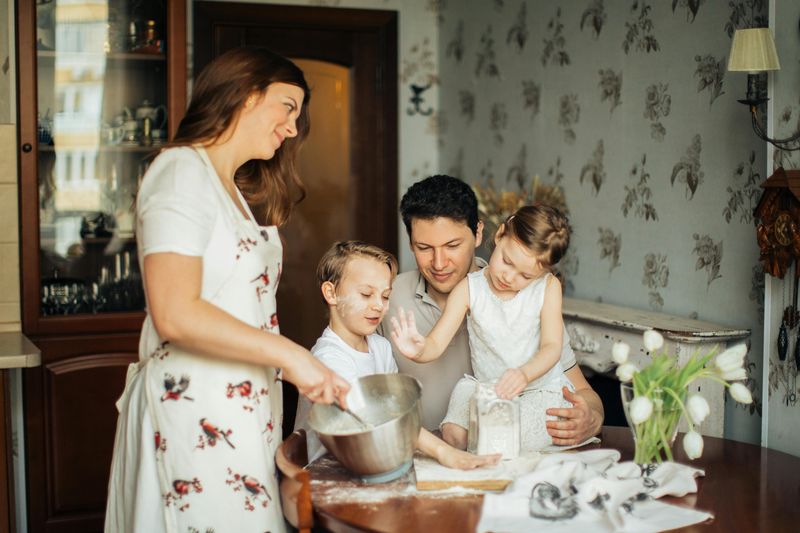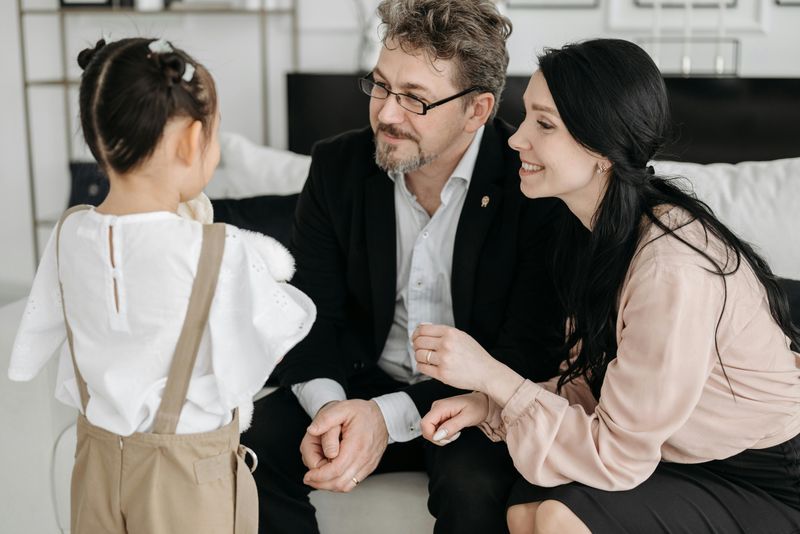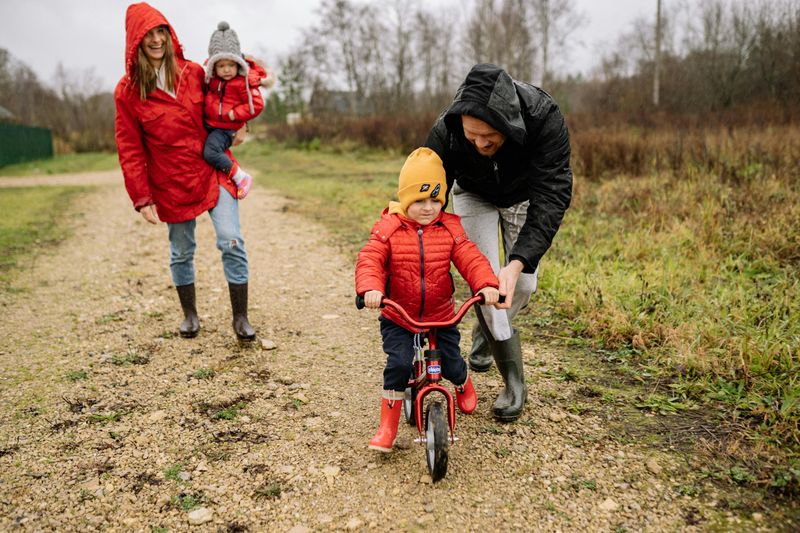Children are like sponges, soaking up not just what we say, but what we do. When it comes to love, kids learn their most powerful lessons simply by watching their parents interact with each other. These silent teachings shape how children will approach relationships for the rest of their lives. The way parents show affection, resolve conflicts, and support each other creates a blueprint for love that children carry into adulthood.
1. Hugs and Kisses Speak Volumes
Parents who freely share warm embraces and tender kisses teach children that physical affection is a natural part of loving relationships. Kids notice when mom and dad hold hands during family walks or cuddle on the couch during movie night.
These small gestures build a foundation for healthy physical boundaries and intimacy later in life. Children learn that touch can communicate care, comfort, and connection without words.
Little ones who grow up in affectionate homes often become adults who are comfortable with appropriate physical expressions of love, neither avoiding closeness nor seeking it obsessively.
2. Respect Forms Love’s Foundation
Marriage becomes a masterclass in mutual respect when parents honor each other’s opinions and boundaries. Children pick up on subtle cues: Dad waiting for Mom to finish speaking before responding, or Mom acknowledging Dad’s contributions to household decisions.
When disagreements arise, respectful parents avoid name-calling, interrupting, or dismissing each other. This teaches kids that loving someone means valuing their thoughts and feelings, even during difficult conversations.
The simple act of saying “please” and “thank you” between spouses shows children that courtesy doesn’t end after the honeymoon – it remains essential throughout a loving relationship.
3. Healthy Arguments Show Resilience
Every couple disagrees sometimes. When parents navigate conflicts constructively, they demonstrate that disagreements aren’t relationship-ending catastrophes but normal bumps in the road.
Children learn valuable lessons watching parents work through differences calmly, without shouting or slamming doors. They see that expressing frustration is okay, but it should be done with care for the other person’s feelings.
Most importantly, kids who witness parents reconnecting after arguments understand that love doesn’t require perfection – just the willingness to work through tough moments together and find your way back to each other.
4. Love Lives in Everyday Moments
Grand gestures make for great movies, but children notice the quiet, consistent ways parents show love daily. A father who brings his wife coffee just how she likes it. A mother who records her husband’s favorite show without being asked.
These small acts of service communicate that love isn’t just about Valentine’s Day or anniversaries – it’s woven into ordinary Tuesday afternoons. Kids absorb the profound truth that real love means paying attention to someone’s preferences and needs.
When parents consistently put effort into these tiny expressions of care, children learn that lasting love isn’t maintained through drama but through thousands of thoughtful moments.
5. Kind Words Build Strong Hearts
“Have a great day, sweetheart!” “You look handsome in that shirt.” Children’s ears perk up when they hear parents exchange compliments and words of encouragement. These verbal affirmations teach kids that expressing appreciation is essential to nurturing love.
Equally important is what parents don’t say. Avoiding harsh criticism, sarcasm, or public humiliation of a spouse demonstrates that protecting someone’s dignity is a form of love. Children internalize this language of respect.
Parents who speak kindly about their partner even when they’re not in the room show integrity in relationships – teaching kids that true love doesn’t change whether someone can hear you or not.
6. Patience Weathers Life’s Storms
When mom waits calmly while dad tells his long-winded story for the hundredth time, children witness patience in action. Parents who give each other grace during stressful times – a job loss, illness, or simply a bad day – model an essential relationship skill.
Kids notice when parents take deep breaths instead of snapping, or when they offer understanding rather than irritation. These moments teach children that love sometimes means giving someone space to be imperfect or struggling.
The ability to weather difficult seasons together without resentment shows children that lasting relationships require emotional stamina and the willingness to stand by someone through their growth process.
7. Teamwork Makes the Dream Work
Children raised in homes where parents function as a team learn that love means working together toward common goals. Whether it’s tag-teaming household chores or collaborating on family decisions, partnership in action leaves a lasting impression.
Kids who see parents dividing responsibilities fairly – not based on outdated gender roles but on preferences and strengths – develop healthy expectations for their future relationships. They learn that love thrives when both people contribute.
The sight of parents supporting each other’s dreams and ambitions teaches children that true partnerships aren’t about competition or control but about helping each other become your best selves.
8. Saying Sorry Mends Broken Bridges
“I was wrong, and I’m sorry.” Few phrases carry more power than a sincere apology. When parents model humility by admitting mistakes to each other, children witness how healthy relationships recover from inevitable missteps.
Kids who see mom or dad take responsibility – without excuses or blame-shifting – learn that accountability strengthens rather than weakens connections. The vulnerability of a genuine apology demonstrates courage, not weakness.
Equally important is watching how the other parent responds with forgiveness rather than holding grudges. This complete cycle of rupture and repair teaches children that relationships can heal and often grow stronger through honest reconciliation.
9. Love Grows Through Daily Tending
Gardens wither without regular care, and so do relationships. Children notice when parents consistently nurture their connection through daily rituals – morning coffee together, goodnight kisses, or regular date nights.
These intentional habits teach kids that love isn’t a one-time achievement but requires ongoing investment. Parents who check in with each other emotionally demonstrate that staying connected takes effort and attention.
When children witness their parents prioritizing their relationship despite busy schedules, they learn a crucial lesson: love must be actively maintained, not taken for granted. This understanding helps them develop realistic expectations about the work involved in lasting relationships.
10. Cheerleading Each Other’s Dreams
“You can do this!” Children’s ears perk up when they hear parents enthusiastically supporting each other’s goals and ambitions. Whether it’s mom encouraging dad to pursue further education or dad celebrating mom’s work promotion, these moments of mutual cheerleading demonstrate love in action.
Kids learn that loving someone means wanting them to shine, not dimming their light out of insecurity. They observe how healthy couples make space for individual growth while remaining connected.
When parents attend each other’s important events or make sacrifices to support the other’s dreams, children absorb the powerful message that true love is generous and wants the best for the beloved.
11. Healthy Boundaries Create Safety
“I need some alone time right now.” Children learn important lessons when they see parents respectfully communicate their boundaries. These moments teach kids that loving someone doesn’t mean sacrificing all personal needs or space.
Parents who honor each other’s limits – whether about physical affection, social engagements, or family obligations – demonstrate that respect for boundaries strengthens rather than threatens intimacy. Kids observe how healthy couples balance togetherness with individual identity.
When parents model assertive (not aggressive) boundary-setting, children develop the confidence to establish their own limits in future relationships, understanding that true love never demands the surrender of one’s core needs or values.
12. Laughter Keeps Love Light
The sound of parents laughing together might be one of childhood’s most reassuring soundtracks. When couples share inside jokes, playfully tease each other, or simply find humor in life’s challenges, they teach children that joy is essential to lasting love.
Kids who grow up hearing mom and dad’s laughter learn that relationships needn’t be serious all the time. They see how shared amusement creates bonds that help couples navigate life’s inevitable difficulties with resilience.
Parents who can laugh at themselves model humility and emotional health. Their example teaches children that perfect relationships don’t exist, but relationships filled with humor and lightness are far more sustainable than those weighed down by constant gravity.












